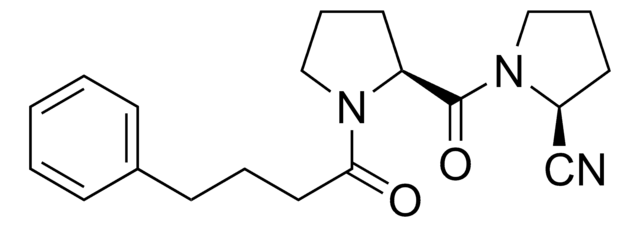SML0205
Z-Pro-prolinal
≥98% (HPLC)
Synonyme(s) :
Cbz-Pro-Prolinal, N-Benzyloxycarbonyl-L-prolyl-L-prolinal, Phenylmethyl (2S)-2-[(2S)-2-formylpyrrolidine-1-carbonyl]pyrrolidine-1-carboxylate, Z-Pro-Pro-CHO, Z-PP-CHO, Z-pro-pro-CHO, Z-prolyl-prolinal, ZPP
About This Item
Produits recommandés
Niveau de qualité
Pureté
≥98% (HPLC)
Forme
powder
Conditions de stockage
desiccated
Couleur
white to tan
Solubilité
DMSO: ≥10 mg/mL
Température de stockage
−20°C
InChI
1S/C18H22N2O4/c21-12-15-8-4-10-19(15)17(22)16-9-5-11-20(16)18(23)24-13-14-6-2-1-3-7-14/h1-3,6-7,12,15-16H,4-5,8-11,13H2/t15-,16-/m0/s1
Clé InChI
ORZXYSPOAVJYRU-HOTGVXAUSA-N
Application
Actions biochimiques/physiologiques
POP has been connected to memory and mood through regulation of the brain levels of its peptide substrates, which include AVP, substance P, neurotensin and TRH and is a potential target in cognitive function, memory, and neurodegenerative disorders such as amnesia, Alzheimer′s disease, and depression. POP has recently been reported to be involved in the release of the tetrapeptide acetyl-N-Ser-Asp-Lys-Pro (Ac-SDKP) from its precursor, 43-mer thymosin β4 (Tβ4). Ac-SDKP is involved in hemopoietic stem cell differentiation, is pro-angiogenic and antifibrogenic.
Mention d'avertissement
Warning
Mentions de danger
Conseils de prudence
Classification des risques
Acute Tox. 4 Oral - Eye Irrit. 2
Code de la classe de stockage
11 - Combustible Solids
Classe de danger pour l'eau (WGK)
WGK 3
Point d'éclair (°F)
Not applicable
Point d'éclair (°C)
Not applicable
Certificats d'analyse (COA)
Recherchez un Certificats d'analyse (COA) en saisissant le numéro de lot du produit. Les numéros de lot figurent sur l'étiquette du produit après les mots "Lot" ou "Batch".
Déjà en possession de ce produit ?
Retrouvez la documentation relative aux produits que vous avez récemment achetés dans la Bibliothèque de documents.
Les clients ont également consulté
Notre équipe de scientifiques dispose d'une expérience dans tous les secteurs de la recherche, notamment en sciences de la vie, science des matériaux, synthèse chimique, chromatographie, analyse et dans de nombreux autres domaines..
Contacter notre Service technique









